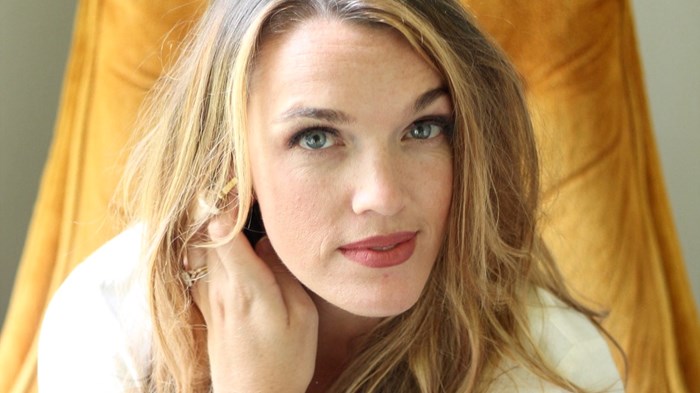Because Christ Did First, I Now Speak Up for Women’s Rights, Too.

“Reclaiming feminism for Christianity” somehow became my tagline. It’s not one I sought out, or one that I particularly wanted given the state of the evangelical church. It just felt like the only option after I had seen what I had seen, met who I had met— and encountered the God who saw it all.
I grew up in the evangelical Christian church and immediately fell in love with Jesus. As I grew, so did the restrictive messages I heard about womanhood. I was taught women should be submissive and silent; followers, not leaders; in the home and not in the world.
In my adolescence, I began to see contradictions in what my home church taught me and what I read in the Bible. I asked questions like, “If women are supposed to be under the leadership of men at all times, what about Deborah who led a nation?” and “Isn’t Vashti in the story of Esther doing right when she refuses to be objectified?”
But quickly my questions were silenced, shamed even. I remember my Bible study leader asking, “Meghan, are you even a Christian? You ask far too many questions.”
It was then I learned what the Church wanted from me was to agree and submit to everything I was taught-- that my questions were a form of rebellion in their eyes. So I tried to ask fewer questions, be less curious, and take things at face value.
It wasn’t until I became a missionary that worked specifically with oppressed and sexually exploited women that shallow Sunday school answers that I had been fed my whole life didn’t work anymore-. I was forced to have conversations about “Christian” teachings that I had been told my whole life were off-limits.
The first time I began to really question male headship was while working as a missionary in Kenya, which according to my upbringing, should have brought forth a thriving society. What I saw instead was that the strict patriarchal role of men being in charge and women being submissive, actually came hand in hand with violence towards women. Girls were expected to go through a procedure known in most of the world as female genital mutilation and were often denied an education because their place was “in the home.” I heard many stories of physical and sexual violence.
I began to wonder if strict patriarchy, so idealized in my Christian community, was actually harming women in Kenya.
Later, this theory seemed to be confirmed while working with trafficked women in the Philippines: I had a man tell me that he came to purchase sexually exploited women because “women here are raised right, they know how to respect men.” It was in the middle of a tirade about women’s proper place, and a man’s need for respect.
At first, I couldn’t place where I had heard words like his before. Then it hit me--he sounded just like the pastors I had grown up with: men who espoused the idea the women were there to respect and serve and meet a man’s sexual desires. Evangelical authors like Emerson Eggerichs of “Love and Respect” echoed this sentiment in marriage books.
So many of my teachings in evangelical culture seemed to communicate to me that women did not exist as an entity unto their own, they were there for men. It lent itself to enormous power differentials and primes the ground for abuse.
A study done in 2015 by the University of South Carolina showed that fundamental religion with male headship is actually a risk factor in intimate partner violence. Psychoanalyst Lyn Yonack says in an article for Psychology Today that sexual violence is actually about a perpetrator’s need for dominance and control-- not sexual urges.
As I connected the dots between the power differentials of my evangelical upbringing and abuse-- I realized that the questions I brought forward in my adolescence should not have been silenced, they should have been welcomed.
It’s no secret that the Church at large has struggled with stories of sexual abuse and assault. It seems that every few months we hear the story of another woman coming forward about the abuse they survived from powerful men in the church.
Perhaps it is the Church’s reluctance to talk about the harmful effects of things like patriarchy and racism that makes us so susceptible to it.
If we go to Scripture, we see that the Bible does not hide from hard subjects, but we do. The Bible talks openly about the devastating effects of patriarchy on women. Bathsheba was raped and her husband was murdered. Hagar was raped by her master’s husband. Abraham gave his wife as a sex slave to Pharaoh to protect himself. In Judges 19 a woman is raped to death.
The problem is we’ve been taught to gloss over these texts, to not ask questions, to believe whatever our pastor says about it. But I believe to gloss over the devastation women live through in these texts is to do a disservice to our faith. Those stories are told in the context of fallen humanity, and I believe set the backdrop of why a leadership like Christ’s is so needed.
In the Old Testament, we hear story after story of men going after more power, more wealth, more prestige-- and then emerges Christ: a man who sought not to acquire power but give it away. A man who came to serve and not be served. A man who welcomed women in his ranks and broke from long-held religious patriarchal norms.
I began advocating for women’s rights because I saw Christ do it first. But I found quickly that it came with a high cost: dear friends told me they couldn’t be associated with me, family members questioned my salvation, countless Christian men sent me abusive emails and comments telling me that I was going to hell and that I deserved violence. The Church had taught them that I could not be a Christ-follower and a feminist.
But perhaps if we had a culture that welcomed questions, that interrogated patriarchal teachings, that allowed civil discourse on new ideas-- I would not need to speak so loudly.
I speak up because girls and women are still being bought and sold. Because women are still being beaten by their husbands. Because girls are still denied an education. Because we live in a society where 1 in 3 women is assaulted. I speak up because I ultimately believe it’s what Christ would do-- and we should live by his example.
Meghan Tschanz is a writer, speaker, and former missionary who is passionate about empowering women and reclaiming feminism for the Christian faith. She's a prolific blogger, host of the Faith and Feminism podcast, author of Women Rising: Learning to Listen, Reclaiming Our Voice, and an avid traveler. She and her husband, Dustin, live in northeast Georgia.
The Better Samaritan is a part of CT's
Blog Forum. Support the work of CT.
Subscribe and get one year free.
The views of the blogger do not necessarily reflect those of Christianity Today.






















